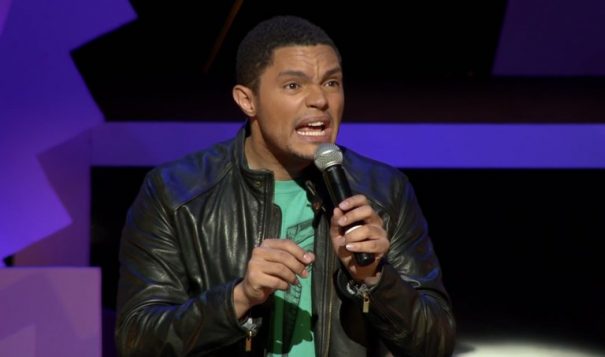 Trevor Noah performs in the 2013 comedy routine during which he made a joke about the beauty of Aboriginal women.
Capture from a Youtube video clip by Trevor Noah
Trevor Noah performs in the 2013 comedy routine during which he made a joke about the beauty of Aboriginal women.
Capture from a Youtube video clip by Trevor Noah
By Celeste Liddle
High Country News
Racially and sexually objectifying Aboriginal women reflects a long practice in Australia and abroad.
In many circles, The Daily Show’s Trevor Noah is an icon of progressive liberals looking to enact broad social change. But to Indigenous women right now, Noah symbolizes something else entirely: a misogynistic racist willing to dehumanize Aboriginal women for laughs.
Until very recently, Noah had been a hero to many Indigenous people due to his incisive commentary on decolonization and racism. He was welcomed as Jon Stewart’s replacement at The Daily Show for the additional layers he brought to the program, as well as his penchant for holding the powerful accountable. But when a video of a 2013 comedy routine performed by Noah surfaced, those views changed for many Aboriginal women, including myself.
In the clip, Noah jokes that there are no “beautiful” Aboriginal women. He then demonstrates that perhaps we could blow men like we blow didgeridoos. In other words, Aboriginal people were so collectively ugly that deep searching would be required to find exceptions to that “rule,” and the only value an Aboriginal woman possessed was sexual.
In the clip, Noah’s audience roared with laughter, but the reaction wasn’t unexpected: He was, after all, reinforcing colonial attitudes most non-Indigenous people are happy to support if it maintains their structural superiority. Indigenous people, regardless of where we live, are often mocked and ridiculed by settlers. In fact, according to the United Nations, the estimated 370 million Indigenous people residing in approximately 90 countries are “the world’s most marginalized peoples, and are often isolated politically and socially.”
This is why Noah’s routine was offensive: Racially and sexually objectifying Indigenous women reflects a long practice in Australia and abroad.
In Australia, Aboriginal women were consistently viewed as spoils of war in the expansion of the frontiers — our bodies sexually exploited for the benefit of explorers on lands stolen from us. Today, Aboriginal women remain victims of rape and sexual assault at rates three times higher than other women in Australia. Much like the Missing and Murdered Indigenous women and girls of North America, crimes against Aboriginal women in Australia frequently fail to be investigated by the police, tried by the courts or penalized. When we are murdered, we are often left unnamed in media reports, and the lack of follow-up in our cases tells us our lives are not considered valuable.
As Aboriginal people, our appearance has been scrutinized for well over a century. Governmental departments used to decide which of us looked “Aboriginal” enough and children with fairer skin were taken from their families to be forcibly assimilated. It took until 2008 for a prime minister to acknowledge and apologize for these past policies. In some jurisdictions, governmental acts declared all Aboriginal people as “wards of the state,” and our living arrangements and marriages were controlled to ensure that Aboriginal women were not giving birth to darker-skinned children. Today, conservative columnists claim that fairer-skinned Aboriginal people use their heritage solely to gain financial benefits despite mountains of evidence to the contrary.
These are the wounds Trevor Noah aggravated when he delivered his jokes. The real shock to us, however, was realizing we would have to defend our humanity to a biracial man who had endured similar injustices.
Trevor Noah had, after all, talked about growing up in post-apartheid South Africa in his book Born a Crime. Australia provided some of the inspiration for apartheid in South Africa through our native mission system along with our White Australia Policy — in place for 80 years to stop non-white immigration. We could relate to him, and had he bothered to do his research, he would have realized that we have shared experiences.
Yet an apology from Noah has not been forthcoming. Instead he has claimed that his “jokes” were old and were relevant only to South African audiences and has since removed copies of the video from the internet.
His explanations would be laughable if they weren’t so offensive. Instead, they prove that the dehumanization of Aboriginal women has expanded from an Australian project to a global one. When we took to social media to challenge Noah’s comments, many of us were attacked by trolls: faceless accounts from across the planet denigrating our looks, our color and our intelligence. A simple apology could have silenced them all. Instead, Noah’s routine became echoed by thousands.
Noah’s jokes objectifying women are not acceptable. All women have the right to be respected as full autonomous beings, not reduced to our physical attributes for the pleasure of men.
What I want from Noah is an apology. I want him to reflect on why his popularity in white, progressive, liberal circles won’t wane in the wake of his racist comments — why people across the world will still tune in after he callously dehumanized Indigenous women.
I want Noah to reflect on whether he wants to be a part of the ongoing, sexist colonial project or if he, as a black man with an international profile, wants to do better.
We are ready to walk together if he is ready to acknowledge our humanity.
Celeste Liddle is an Arrernte woman from colonized Australia, a freelance writer and social commentator.
